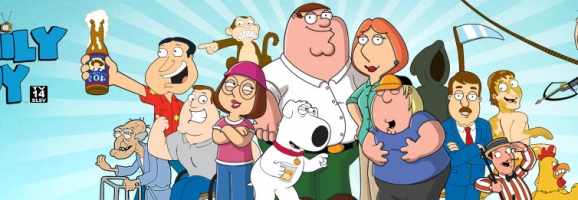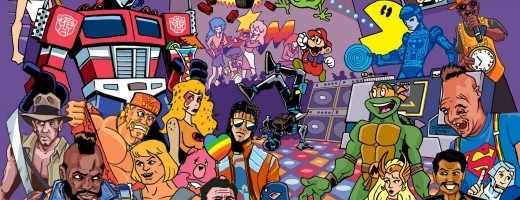Family Guy and Adjusting Our Thinking About Demographics

Many shows target a specific audience, or demographic of people, such as crime dramas or home improvement shows. But Family Guy and other social commentary shows like it appeal to a very unique and somewhat split demographic. The demographic is unique because the pop culture references embedded in Family Guy’s format are primarily drawn from the 70s and 80s, so only previous generations are guaranteed to get all the references; yet, the humor tactics involved appeal to younger people and can even be called “immature.” When I was in middle school, “Last night on Family Guy” was an extremely common conversation opener, indicating how popular the show is with pre-teens and early teens. Yet the show is not considered appropriate for children that age and is rated Mature on TV according to TV Parental Guidelines. By college, when this show is socially acceptable to watch, many of us no longer care about Family Guy as much and only watch it if we happen to catch it on TV when we have an interlude in studying. This suggests that Family Guy targets the wrong age group, and should target perhaps teenagers more. This would mean changing the ratings. But is that a good idea? How can a show with such a split demographic be so successful anyway, especially with teenagers?
Part of the show’s success is based on the fact that the younger generations who generally watch the show were exposed to much of the pop culture included in it by their parents. Their parents would play the movies and maybe even the soap operas and sitcoms of past decades, so the references are not entirely lost on younger people. Many of the references are also borrowed from movies or shows that became American icons, with quotes or scenes that people love to quote, so that even if you haven’t watched said movie or show, you know where the reference is from. A good example of this would be “Say hello to my little friend!” on Scarface. But many of the references are lost on younger people. I find that a decent number of Family Guy scenes go over my head. They still work for younger viewers, however, because the writers of the show are great at making them funny or at least silly. Knowing where the reference is from adds to the humor of it, but you can still enjoy the scene without that knowledge.

Another thing to consider is that people are not as black and white as statistics make them seem. Generally, yes, younger people like Family Guy and older people find it offensive and vulgar or just stupid. These differences are most likely due to differences in humor between generations. It may also be related to how people change the way they see the world as they gain life experience and lose patience for certain things, which affects their sense of humor. But, not all people who grew up in the 70s and 80s now find Family Guy too immature for their tastes. There are some viewers older than the expected demographic of this show. There are also much younger viewers, people who may not be old enough to watch this show but do anyway either because they have a more mature sense of humor or else they just like the idea of watching what the older people they know watch.

Family Guy is just one example of a show with a strange demographic that exceeds what is assumed. There are many other shows with viewers much younger or older than the target audience. This brings the way we rate our shows and the age restrictions we place now on media content into question. Perhaps the rating system is unfair. Perhaps the thoughts about demographics our media has are not entirely accurate.
Demographics are fairly tried and true. Certain people are known to prefer cooking or DIY sewing shows; some people just watch serious shows, crime dramas, and maybe the news; and others prefer more vulgar comedy shows. There are fairly consistent stereotypes of who likes which shows, based on age, race, gender, even religion. But these stereotypes may be getting outdated, as people change with time and old divisions between people are becoming blurred.
More young kids may now be “worldly” enough to grasp more mature humor, and hence these younger audiences prefer more mature shows. This is illustrated by the huge number of kids who watch Family Guy or South Park. Should they be barred from the shows they understand and like merely because of their age? Should they be sheltered from having their minds formed by these shows with mature material? Or should they be allowed to watch these shows if they can understand them already? Their minds seem to already be pretty formed if they get the humor included in shows such as Family Guy. The way shows are rated seems to be based on age, not on maturity levels.

Similarly, is it fair to label shows as immature and set social “too old” limits on them? Peoples’ sense of humor may change with age, but not everyone matures at the same rate. Also, the chance that sense of humor is more of a generational thing than an age thing implies that future generations may find things such as Family Guy funnier than previous generations did, regardless of age. So if humor is more of a generational thing than an age thing, the label immature may no longer be relevant if everyone still laughs at certain shows regardless of age. Should we ban ideas of maturity or at least alter them to accommodate the changing generational senses of humor?

Family Guy and many other shows, particularly in the comedy genre, are indications of changes in the sense of humor, maturity, and even speed of growing up in contemporary generations. Our thinking about ratings and maturity have not changed in a while, though. Perhaps it is time we caught up our thinking. If we did this, we could get TV executives to change their thinking as well, and thus alter the way shows are rated and what audiences are targeted with programming.
What do you think? Leave a comment.











Family Guy viewers seem to be rebels or rule breakers. They do not like authority, think rules and structure are unfair, and tend to be heavy users of sarcasm.
The show creator’s utilisation of countless controversial issues made to be comical mixed with white, grey and black propaganda makes it hard at points to decipher what is only a joke and what has an underlying serious message.
Family Guy was great back in the day, but the market is simply too saturated now with shows that are similar yet better, and as you say, they are marketing to the wrong demographic. As a 23 year-old, I don’t know many people who still watch Family Guy, but I do know a larger number of people who still watch South Park, or started watching Archer or shows similar to that. Family Guy is just too slapstick for what people near their twenties want as far as an animated comedy series is concerned.
You make a good point. I love Archer and similar shows but Family Guy just doesn’t really do it for me anymore. It was way more popular among my peer group and I even liked it more back in high school, even junior high.
Family Guy is an excellent example of a show that has run its course. It’s astounding that Seth McFarlane has been able to keep it going with the failure that was “The Cleveland Show” and with “American Dad” really falling out of the limelight. That being said, your views on the changing demographic is really interesting. The “maturity” concept comes in mind for me personally because of the effect shows like “Family Guy” or “South Park” have on kids today. I still remember walking through my neighborhood in high school and hearing little kids cuss each other out.
My most favorite part about Fam Guy is that it is on Fox. You know, that Tea Party loving, pretending to be on Gods side all knowing Conservative family values and all American Patriot bag of hypocrites who love most of all money. I suppose most people never reallly think much about that do they.
Hmmm that is a good point. The show seems to be about a lot of conservative values and the blue collar lifestyle, if you look really deeply.
@Eaves
I think Fox literally just makes/show media that’s controversial, or at least underrepresented by other networks. Essentially I think they’re just mercenaries, doing what no one else gives. So by having liberal satires & conservative favoring media, I think they’re just playing the markets, trying to collect ratings from everybody so they can sell a diverse range of markets to their advertisers. Business-wise it’s smart AF.
Family guys target audience is mostly for people who lived in the 80’s. I’d say
Yes but the humor is more that of an obnoxious tween, hence why I said the show has a strange and split demographic.
Family Guy, in recent years, has expanded its world of storytelling and tackled serious topics that range from religion to domestic abuse. Of course, each of these episodes still incorporate the now famous cutaways that tell some joke or are so random they don’t fit into the episode at all. This is how the show maintains its comedy. Still, the newer episodes raise thought-provoking questions and ask the audience to think about what they are watching rather than sit mindlessly and laugh. Perhaps Family Guy is bridging the gap or simply creating a space for more dialogue to exist between generations.
Samira
Excellent response to this article. I really like how you said “bridging the gap or simply creating a space for more dialogue…”that it opens the door for conversation. That is a very astute observation. The show is inclusive with its satire; no group has proven to be exempt from these writers. Somehow they have gotten into our heads heard our thoughts and put them in front of us to deal with. I do not equate a specific demographics to the viewing audience. I do know that the people I enjoy spending time with, which encompasses a wide range of demographics watch or watched and enjoy or enjoyed this show. Maybe it is not so popular now but when it was first released and then the onset of the re-release it was very popular. I do think they based Quagmire on the infamous Charlie Sheen. They have a similar profile and lifestyle. Giggity .
Maybe so! I have noticed a bit deeper content in the newer episodes but also a little less, or more forced, comedy. Maybe they’re just growing up, or they really are trying to bridge a gap and appeal to more maturity groups.
It could also simply be that Seth MacFarlane is just growing up as a person. Maybe he has no deep-seated intentions to reach vast audiences or bridge the gap between generations. Maybe he just isn’t able to convince himself to put out the same type of stuff he was putting out ten years ago. Personally, I still think his recent seasons of Family Guy are too slapstick for my own taste; but I agree with you that the show has experienced some striking differences over the years, one of which is the increased focus on deeper issues.
If you look at his recent work, you will find more credence to this notion. The guy produced the remake of Cosmos for Pete’s sake! He has put out OK movies as well. Sometimes people just get tired of the same old shtick, and it seems that for Seth MacFarlane, this has given him reason to explore challenging and thought-provoking issues, which has inevitably bled into his prized-show Family Guy.
I am hugely surprised at the extent to which it, in fact, does not matter to kids whether they get the assorted references or not. I grew up saturated with 70’s and 80’s cultural material, and though I had to bridge a maturity gap in order to reach my parents, Family Guy is able to click with them because of this. Conversely, Family Guy is able to click with those too young or deprived of baby boomer culture by way of slapstick humor, by shocking violence or disgusting indecency. But from these two categories I would argue has emerged another, one to bring the two and in the darkness bind them. That is, and here I argue against McComb, the college viewer, the supposedly “Mature” audience. Many of us by now, through either parents or Netflix or curiosity, have have learned the culture of old yet still retain the carefree gimme-humor of the more recent seasons of Family Guy. Combining these understandings, the understanding of cultural references and the understanding of the flexibility of comedy, we exist (I count myself as one of them) as a premier class of Family Guy enthusiast. And, as a Family Guy enthusiast, I would say that there is a huge further point that has not yet been made. That is the importance of the seasons. Season 1 of Family Guy was similar to the Simpsons, with sparse and relevant cut-aways and cheeky cultural references. It was kinder and more representative of the earlier generations’ temperament, not to mention humor, which it contained in plenty without resorting to what it does now, to Peter on lions and Lois unflinchingly deprecating Meg. This first season was golden, and I do not believe it would be rated Mature if it were to come out today, when we can clearly see the standards for “Maturity” as dictated by the men upstairs. The later seasons develop problems; I have identified the source of the problems as beginning in Season 7, the last truly good season. Following that were several leaps toward the needy youngster who once was satisfied with a slap in the face in order to achieve plot-resolution but now requires successive slaps on a variety of people and other pains and ills to befall the characters of the show, in order to maintain viewership. The references have been quietened and in multiple occasions the expense of the joke is the admittedly low cultural knowledge of the viewer as in season 3’s “One if by Clam, Two if by Sea,” where Benjamin Disraeli scolds the audience by saying “You don’t even know who I am!” I’m arguing that this indicates their mastery of one demographic, the young, since the earlier seasons were, with their sensible violence and honest imprudence, suited to a more mature, not necessarily “Mature,” audience.
Lewis makes an excellent point about how the program can bridge age gaps. FG is probably aware that children watch television with their parents and chooses cultural icons and quips that only the parents will understand, while also using animation and surrealism to make the program palatable to a younger audience. It’s a great way to reach multiple audiences!
Humor takes many forms and cycles, similar to fashion trends which return every 30 years. The brand of comedy one enjoys, may not have much to do with their age group. For example, my personal comedic preferences (improvisational, observational and character genres) are probably a result of my theater background. I’m not sure it has that much to do with my age.
It’s also interesting to note the series’ popularity abroad despite many of the pop culture references only making sense to an American audience. I live in the UK where Family Guy is just as popular as it is in the US, but most people wouldn’t know anything about half the TV shows and celebrities they feature. I think you eventually come to see Family Guy as making fun of celebrity culture and the media in general, with each individual reference contributing towards that.
Interesting! I did not know about its popularity abroad. This goes to show the references are not key to enjoying the show.
This article was very thought provoking, and may have actually helped inspire my next article. It was structured and interesting. Thank you.
I don’t think the majority of the jokes on Family Guy are really that old.
Like the author, I grew up on FG and was able to understand most of the jokes,
admittedly some went right above my head. But for the most part (at least as I remember it, I haven’t seen the show in a little bit) I thought FG was pretty current.
You make good points and what you say is true. I love the show because it is so hilarious, but sometimes I feel like you don’t really learn anything from it so I shouldn’t watch it. It is just so funny that it becomes irresistible. Good article.
You’ve raised an interesting point about maturity with relation to how television shows are rated. However I would think that maturity is more subjective. It’s difficult to gage how fast one person’s mind is able to catch the subtleties of this kind of humour and I would assume that it would be even more difficult to try & box this development within specific age groups.